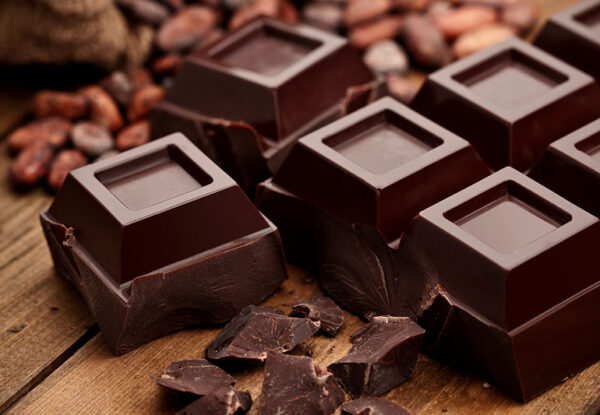Introduction
Dark chocolate, with its luxurious taste and myriad health benefits, has earned a special place in the hearts of chocolate connoisseurs worldwide. Beyond its delectable flavor, dark chocolate is renowned for its potential health perks, captivating the palate while offering a guilt-free indulgence. In this article, we delve into the fascinating world of dark chocolate, exploring its origins, nutritional value, health benefits, and its unique connection with the human experience.
A Brief History
Dark chocolate traces its roots back thousands of years to ancient Mesoamerican civilizations, where cacao beans were revered as sacred and used in ritualistic ceremonies. However, it wasn’t until the arrival of Europeans in the Americas that chocolate began its journey to becoming the beloved treat we know today. Initially consumed as a bitter beverage, chocolate underwent significant transformations over the centuries, evolving into the smooth, velvety confection we cherish.
Origins and Production
Dark chocolate starts with the cacao tree, native to Central and South America, where cacao pods containing beans are harvested. These beans undergo a meticulous process of fermentation, drying, roasting, and grinding to develop their characteristic flavor and texture.
Chocolate manufacturers then combine the resulting cocoa mass with sugar and sometimes additional ingredients like vanilla or lecithin before molding it into bars or other forms.
Nutritional Profile
Dark chocolate is celebrated not only for its exquisite taste but also for its impressive nutritional profile. Rich in antioxidants, particularly flavonoids, dark chocolate offers potential health benefits such as improved heart health, reduced inflammation, and enhanced cognitive function. Moreover, it contains essential minerals like iron, magnesium, and zinc, contributing to overall well-being.
Health Benefits
Numerous studies have highlighted the health benefits associated with moderate consumption of dark chocolate. Its antioxidant properties help combat oxidative stress, which plays a role in various chronic diseases.
Additionally, researchers have linked dark chocolate to lower blood pressure, improved blood flow, and reduced risk factors for heart disease.
Furthermore, its flavonoids may support brain function and mood regulation, offering a delightful mood boost with every bite.
The Pleasure Principle
Beyond its nutritional merits, dark chocolate holds a profound allure for the human psyche. Its rich, complex flavors stimulate the senses, triggering a cascade of pleasurable sensations. From the satisfying snap as you break off a piece to the smooth, creamy texture as it melts on your tongue, dark chocolate tantalizes the taste buds and evokes a sense of indulgence and satisfaction.
Culinary Versatility
Dark chocolate’s versatility extends beyond being a standalone treat. It serves as a culinary powerhouse, lending its distinct flavor to an array of dishes and desserts. From decadent cakes and cookies to savory mole sauces and rich hot cocoa, dark chocolate enhances both sweet and savory recipes, adding depth and sophistication to every bite.
Artisanal Craftsmanship
In recent years, artisanal chocolate makers have experienced a resurgence, as they dedicate themselves to preserving traditional techniques and showcasing the diverse flavors of cacao.
These craftsmen source high-quality beans from around the world, carefully crafting small-batch chocolates that highlight the unique terroir and flavor profiles of different cacao varieties. Each bar becomes a work of art, inviting chocolate lovers on a sensorial journey of discovery.
Environmental and Ethical Considerations
While indulging in the pleasures of dark chocolate, it’s essential to consider its environmental and ethical implications. Sustainable practices, fair trade certification, and support for cacao farmers are crucial factors in ensuring the long-term viability of the chocolate industry. By making informed choices and supporting ethical brands, consumers can enjoy their favorite treat with a clear conscience.
Conclusion
Dark chocolate stands as a testament to the harmonious union of indulgence and well-being, offering a symphony of flavors and health benefits to delight the senses and nourish the body. From its ancient origins to its modern-day resurgence, it continues to captivate hearts and palates around the globe. So, the next time you savor a piece of it, take a moment to appreciate the centuries of craftsmanship and the myriad joys it brings to the human experience.
